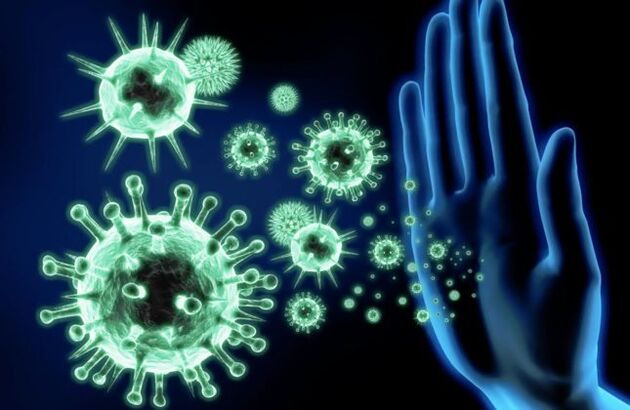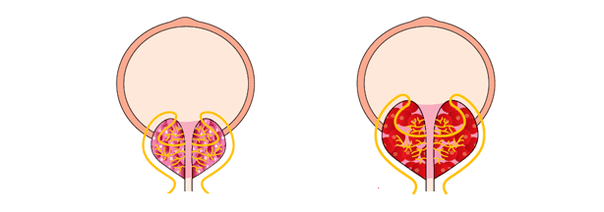Inflammation of the tissues of the prostate gland is very common, and in men the causes of prostatitis are infections and obstruction. According to statistics, after 30 years, 30% of men already suffer from this disease, and as they get older, their number increases, the disease becomes younger. As you know, the best treatment is prevention, and if we know the causes of a particular pathology, it will be easier to protect ourselves from it.
Where does prostatitis come from?
The clinical picture of the disease may include a different set of symptoms. The most common and significant are urinary disorders and sexual dysfunction. In any case, the set of symptoms and the degree of their manifestation depends on a person's individual characteristics, in particular, lifestyle, general health and the functioning of the immune system.

It is common to distinguish two forms of the disease according to the causes:
- contagious
- stagnant.
Causes of the development of infectious prostatitis
The causes of prostatitis in the infectious form of the disease are pathogenic microorganisms. In this case, the disease develops during the formation of the focus of infection in the prostate gland. It can occur in both acute and chronic forms, but infectious prostatitis is more often acute. At the same time, the man's general well-being deteriorates, there is pain in the lower back and groin, the process of urination is disrupted, and the body temperature rises.
Acute prostatitis
The immediate causes of prostatitis in men are foci of infection that can be located in completely different organs. Pathogens enter the prostate either by rising above the rectum or urethra, or by descending through the blood and lymph.
The most common causes of acute prostatitis:
- colibacillus,
- Staphylococcus aureus,
- streptococcus,
- Guests.
What causes prostatitis, where are the foci of infection that cause acute inflammation of the prostate gland? First of all, urological infections, sexually transmitted diseases, diseases of the upper respiratory tract, intestinal infections can cause prostatitis. Even banal caries can lead to the development of prostatitis because there is an infection in the decayed teeth.
The increasing route of transmission of pathogenic microorganisms is their entry into the tissues of the prostate gland from the rectum and urethra. When does this happen? Often this phenomenon is associated with urological infections: cystitis, urethritis, pyelonephritis. Possible causes of prostatitis are sexually transmitted diseases, the most common of which is gonorrhea. If a man has the disease, an infection center is formed near the prostate gland. This means that the pathogenic microflora can easily spread to the prostate tissue. The entry of gonococci or Trichomonas into the prostate gland can occur through unprotected contact if the partner is ill.
The downward spread of the infection means that it penetrates the organs located above the prostate through the blood or lymph. In this case, the causes of prostatitis are infections of the throat, upper respiratory tract or oral cavity. Diseases that cause prostatitis can include bronchitis, influenza, tonsillitis, tuberculosis. Inflammation of the prostate resulting from these problems is usually a complication, and the first symptoms appear a few weeks after the main infection.

Immunity plays an important role in the occurrence of inflammation. Not all men with foci of infection develop prostatitis. If the body is in an active strong state, the immune system fights the infection and the pathological process stops. Deterioration of the defense situation leads to the development of complications. They manifest themselves in various diseases, all of which depend on individual characteristics and "weak" points in the body. The prostate gland is one of the most sensitive organs in the male body, so any adverse effects can affect his condition.
Why does immunity fall? This is due to stress, nutrition, sedentary lifestyle, hypothermia. The infections themselves, especially sexually transmitted infections, become a factor in reducing immunity and contribute to the development of complications.
Chronic prostatitis
In the acute form of the disease, all the symptoms are very bright, it is impossible to ignore them, so men with acute prostatitis, as a rule, seek medical advice immediately. The chronic form of the disease is slow, the symptoms are not very obvious, the health condition often remains satisfactory and the temperature is normal. The high prevalence of chronic prostatitis is due to the fact that it is less symptomatic. Men are not inclined to actively treat the problem without bright, characteristic symptoms, so they usually do not rush to the doctor with mild manifestations of prostatitis.
What causes chronic prostatitis? The reasons may be the same as in acute prostatitis, but the disease does not worsen due to the work of the immune system or the weakness of the pathogenic microflora, but develops slowly. However, often the cause of chronic prostatitis is an acute form of the disease, which is not treated effectively enough.
Reasons for the transition from acute prostatitis to chronic prostatitis:
- Late start of treatment,
- Wrong start of treatment
- Lack of treatment
- Significant decrease in immunity.
In chronic prostatitis, the inflammatory process of the tissues of the prostate gland is not expressed, so the symptoms may not be felt until inflammation occurs.

The peculiarity of chronic prostatitis is also that the initial inflammation of the prostate leads to a deterioration of the innervation of the body, which adversely affects its function and can lead to autoimmune processes. During these processes, the immune system produces antibodies against the tissues of the prostate gland. Even after the infection is cleared, prostatitis will progress.
Causes of non-infectious prostatitis
Non-infectious, ie congestive prostatitis is caused by a blockage in the pelvic region. It is often chronic, develops gradually, and over time increases the symptoms. This is the most common form of prostatitis.
What causes prostatitis in men in most cases? The main reason is circulatory disorders, its stagnation. As a result, the body does not receive enough nutrition, oxygen, there is no complete secretion, that is, there are favorable conditions for the development of inflammation. This condition usually occurs in very inactive men, less often in the background of trauma.
Causes of stagnant prostatitis
- Lack of physical activity
- Sitting at a desk for a long time, work related to driving a car,
- Irregular sex life
- Constipation
- Excess weight,
- An unbalanced diet
- Often the urge to urinate is limited
- Smoking and alcohol abuse
- Back injuries
- Features of the structure of the organs of the genitourinary system.

All these causes have a negative impact on both local and general blood circulation. For example, smoking and regular alcohol consumption greatly weaken the vascular tone, which disrupts blood flow throughout the body. The prostate gland also suffers from this. Depression in the pelvic organs affects men who are sedentary, as well as those who spend a lot of time driving or are accustomed to passive rest on the couch. Sitting for long periods of time is generally not good for men's health. In one way or another, the arteries that supply blood to the pelvic region are constricted, making the prostate worse.
An unbalanced diet leads to deterioration of the general condition of the body, overweight, deterioration of intestinal function. All this has a negative effect on the state of blood circulation, especially on the organs of the genitourinary system.
Sex life is very important for men's health, it should be regular. Sex three times a week can be considered average figures, but each has its own characteristics, which depend on the man's constitution, desires and needs. Inadequate sexual activity leads to stagnation, because the tension that inevitably accumulates does not lead to ejaculation. Not only blood stasis, but also the secretion of harmful substances in the prostate occurs.
Excessive sexual activity is also harmful, because it takes too much energy from a man, leads to physical and nervous exhaustion, hormonal imbalance. All this becomes a factor that causes inflammation of the tissues of the gland.
A sedentary lifestyle is one of the most common causes of prostatitis in men. Today we move a lot by transport, we go upstairs by elevator, a lot has been done to make our lives easier. However, the human body, especially men, is designed for high physical activity. To achieve this, men must engage in some sport. You can always choose the one you like and enjoy. Good results are obtained with daily gymnastics, consisting of simple exercises and walks.
The anatomical features of blood vessels or other structures in the pelvic region can cause prostate obstruction. These features can be acquired as a result of congenital anomalies or defects, as well as trauma or other diseases. Disorders in the structure of tissues, the condition of blood vessels, the formation of cysts or tumors often lead to significant changes in the functioning of both the body itself and the arteries and vessels that supply its blood.
When to worry
If a man feels that he has problems with urination, began to go to the toilet more often, is worried about pain in the lower back, groin, then you should consult a urologist. Manifestations, even small ones, should be ignored. The appearance of such symptoms indicates unfavorable changes in the body.

You should consult a urologist if you have problems with urination, pain in the groin and lower back!
Diagnosis and treatment
The causes and treatment of prostatitis are closely linked, so a complete diagnosis is necessary to successfully eliminate the disease.
Diagnostic procedures
- Anamnesis collection,
- digital rectal examination,
- Ultrasound,
- bacteriological analysis of prostate secretion,
- Blood and urine tests,
- Analysis to determine PSA levels.
These procedures give an idea of the condition of the prostate gland, allow you to determine the inflammation and its causes. PSA levels are required to rule out adenoma and prostate cancer. Such repeated tests are needed to monitor the success of treatment.
Treatment of prostatitis should be carried out in a complex way by the following methods:
- drug treatment,
- massage,
- physiotherapy,
- physiotherapy.
Depending on the cause of the disease, drugs are prescribed that eliminate the infectious component, improve blood circulation, improve the output of urine and glandular secretions, and relieve spasms. The sooner treatment is started and the more responsible the man is, the better the results.
But the best way is to prevent the disease, then you will not need treatment. Prevention for a man is to avoid causes and motivating factors, lead a healthy lifestyle and be sexually active.
























